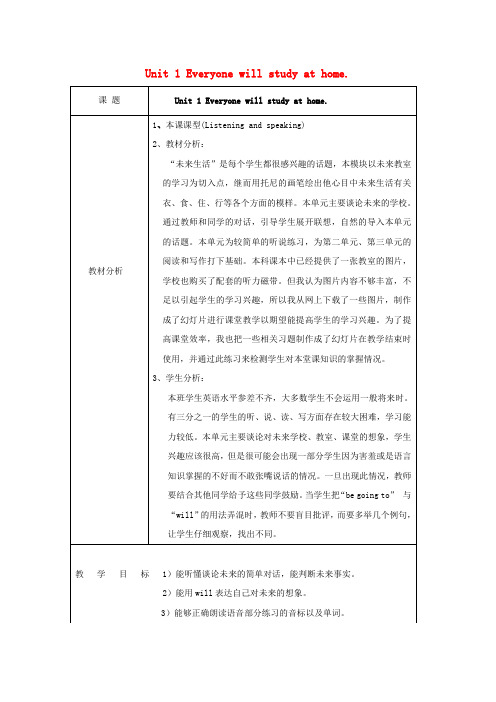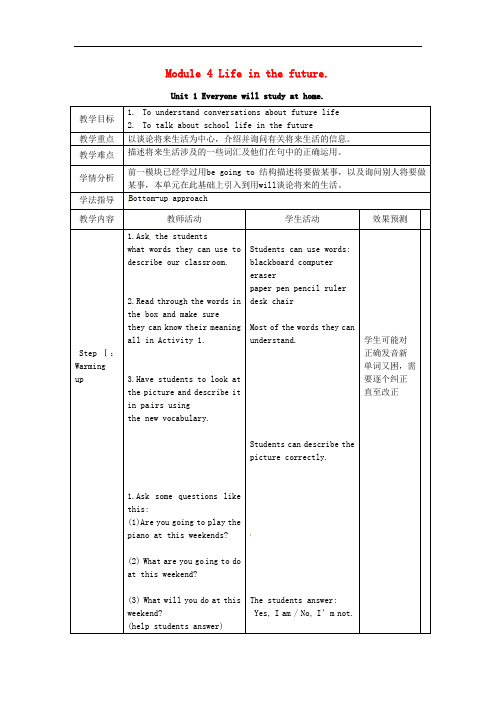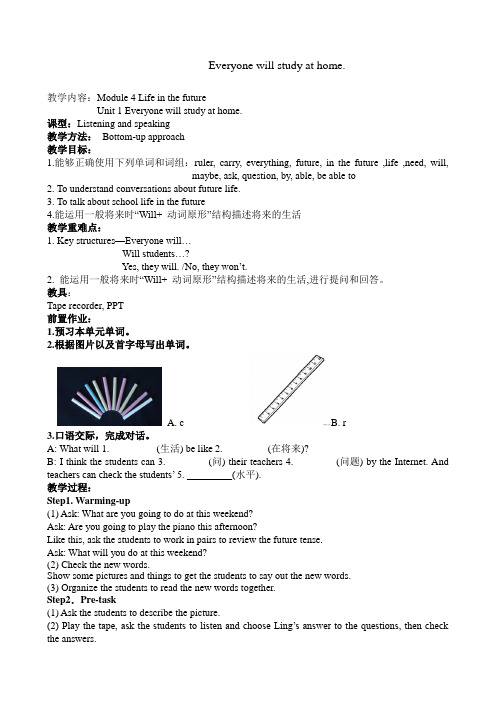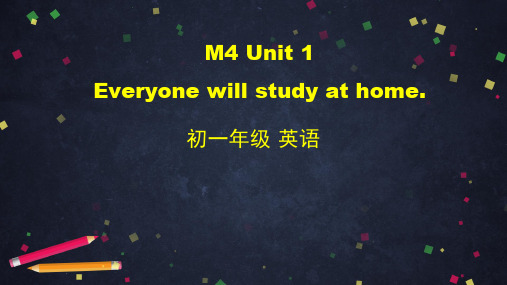外研版七年级英语下册Module4Unit1Everyonewillstudyathome(第2课时)教案
- 格式:doc
- 大小:98.01 KB
- 文档页数:2


外研版七年级下册Module 4 Unit 1 Everyone will study at home学案Unit 1 Everyone will study at home.教案一、教学目标:1. 知识目标:通过学生自主学习,掌握本单元的词汇及短语。
2. 能力目标:能够听懂谈论未来的简短对话,判断未来事实。
能用will 表达自己对未来学校的想象。
3. 情感目标:通过对未来学校的憧憬,培养乐观向上的精。
二、教学重、难点:1. 掌握“will +动词原形”的用法。
2. There be 句型的一般将来时态。
三、教具准备:学案,录音机四、教学方法:自主学习,小组合作五、教学步骤:Step 1: Warming-up1. Greeting each other.2. Talk with the students.Where are you?What are you doing now?Ok. Today everyone studies at school.What will happen in the future?Perhaps everyone will study at home in the future.Step 2: Vocabulary.Check the preparation, and read them.Use the Picture in Activity 1.Ask: What can you see in it?Look around our classroom.What words can you use to describe our classroom?Work in groups, solve Activities 2 and 3.Step 3: Listening1. Daming and Betty are talking about schools in the future. Listento the tape and finish Activity 4.Check the answers. Fill in the blank on your papers.Solve the questions that the students have.2. Play the recording, students listen and repeat.Practise reading the dialogue in pairs.Ask some pairs to act out the dialogue.3. Work in groups, answer the questions as quickly as you can.4. Do you have any questions? Solve the questions.5. Complete the sentences according to the dialogue.Step 4: ExpansionAccording to the dialogue to describe what your school will be like in 10 years.Step 5: Test1. Finish the exercises on the paper by yourselves.2. Check in pairs.Step 6: HomeworkFinish off the exercises in your workbook.Preview next unit.Module4 Life in the future.Unit 1 Everyone will study at home.学案一.学习目标:1. 知识目标:通过自主探究,掌握本单元的词汇及短语。


外研版七年级下册Module4Unit 1 Everyone will study athome教案I. Teaching Objectives:By the end of this lesson, students will be able to:1. Understand the concept of studying at home and its implications.2. Use the future tense to talk about predictions and future plans.3. Use technologyrelated vocabulary in the context of home study.4. Describe potential advantages and challenges of studying at home.5. Participate in group discussions and roleplays about studying at home.6. Write a short paragraph or essay about their own experiences or predictions about studying at home.7. Reflect on the importance of adaptability and the use of technology in education.II. Key Vocabulary:Verbs related to studying (study, learn, research, practice)Nouns related to technology and home study (internet, puter, software, online class)Adjectives describing the experience of studying at home (convenient, flexible, challenging, effective)Phrasal verbs for describing technological actions (log on, download, access, submit)Time expressions for future events (in the future, next year, by 2025)III. Target Language Structures:Simple future tense (will + verb)Future continuous tense (will be + verb+ing)Second conditional for predictions (If I have a question, I will ask the teacher online.)Making educated guesses using might (I might need more guidance if I study at home.)Yes/No questions with the future tense (Will we use paper books in the future?)Tag questions for confirmation (We'll need internet access, won't we?) IV. Teaching Aids:Multimedia projector for displaying slides and video clips about home study and online classesWhiteboard and markers for illustrating key points and grammar rules Images and realia depicting home study environments and educational technologyHandouts with sample sentences, discussion questions, and writing promptsVisual aids such as timelines to help students conceptualize the future Audio recordings of online classroom interactions or experts discussing elearning trendsV. Teaching Procedures:Step 1: Warmup (5 minutes)Begin with an engaging activity like a quick survey on students' experiences with home study or online learning.Introduce key vocabulary through a word wall activity where students post words related to home study.Step 2: Prereading (5 minutes)Show students images or short video clips of children studying at home, discussing what they see and predict.Review the target language structures, focusing on the simple future tense.Step 3: Whilereading (15 minutes)Provide a reading text that talks about the future of education, including predictions about studying at home. Ask students to read along, identifying key points about home study.Lead a guided class discussion to ensure prehension and encourage students to share their thoughts on the topic.Step 4: Postreading (15 minutes)In pairs or small groups, students discuss how they think their studies might change in the future using the target language structures. Circulate the classroom to provide feedback and support accurate use of future tenses.Step 5: Speaking Practice (10 minutes)Conduct a roleplay activity where students take turns pretending to be students and teachers discussing the pros and cons of home study. Some pairs can perform their roleplay for the class.Step 6: Writing Task (10 minutes)Assign a writing task where students draft a paragraph or essay describing their vision of their future study environment, using the target language structures and including specific details.Encourage students to consider both positive and negative aspects of studying at home.Step 7: Homework & Review (5 minutes)As homework, assign students to create a mind map or a poster showing the benefits and drawbacks of studying at home.Review key vocabulary and language structures through a "T echnology and Learning Quiz," where students answer questions about different aspects of home study.VI. Assessment:Evaluate students based on their participation in discussions, prehension during reading tasks, correct usage of future tenses in speaking practice, and the quality of their written assignments. Assess the ability to make predictions about the future of education and home study using the second conditional and other future tenses accurately.。

Everyone will study at home.教学内容:Module 4 Life in the futureUnit 1 Everyone will study at home.课型:Listening and speaking教学方法:Bottom-up approach教学目标:1.能够正确使用下列单词和词组:ruler, carry, everything, future, in the future ,life ,need, will,maybe, ask, question, by, able, be able to2. To understand conversations about future life.3. To talk about school life in the future4.能运用一般将来时“Will+ 动词原形”结构描述将来的生活教学重难点:1. Key structures—Everyone will…Will students…?Yes, they will. /N o, they won’t.2. 能运用一般将来时“Will+ 动词原形”结构描述将来的生活,进行提问和回答。
教具:Tape recorder, PPT前置作业:1.预习本单元单词。
2.根据图片以及首字母写出单词。
A. c____________B. r__________3.口语交际,完成对话。
A: What will 1._________ (生活) be like 2._________(在将来)?B: I think the students can 3. ________(问) their teachers 4. ________(问题) by the Internet. And teachers can check the students’ 5. _________(水平).教学过程:Step1. Warming-up(1) Ask: What are you going to do at this weekend?Ask: Are you going to play the piano this afternoon?Like this, ask the students to work in pairs to review the future tense.Ask: What will you do at this weekend?(2) Check the new words.Show some pictures and things to get the students to say out the new words.(3) Organize the students to read the new words together.Step2.Pre-task(1) Ask the students to describe the picture.(2) Play the tape, ask the students to listen and choose Ling’s answer to the questions, then check the answers.Step3. Listen and read.(1) Guide the students to listen to the conversation and answer the questions:Question1: Will there be schools in the future?Question2: Will the students be happy in the future? Why?(2) Organize the students to read the conversation after the tape.(3) Ask the students to read the conversation in groups, and then ask some groups to act out theconversation.(4) Organize the students to check the students’ ideas about the future.(5) Organize the students to complete the passage with the correct form of the words and expression from the box.Step4. Solve the language points(1) Ask the students to find out the difficult points, and let them show out.(2) Help the students to solve the difficult points.Step5. Do some speakingShow some pictures and things to organize the students to talk about what their school will be like in ten years like this: We will study at home and only go to school for sports and games…Step6. SummaryGet the students to sum up the language points.Step7. Homework(1) Remember the words and finish the exercise of Unit1(2) Prepare Unit 2.Step8.Exercise.5-8分钟检测题(满分:100分)一.用适当的介词填空。

教案设计:Module 4 Life in the futureUnit 1 Everyone will study at home.课型:Listening and speaking教学目标:1. 知识目标:(1)To understand conversations about future schools(2)To process information of future life in the listening material(3)To talk about the prospe ct of one’s own school(4)Key vocabulary: cable TV, calculator, cell phone, chalk, Internet, satellite, everyone, no one (5)Key structures: will + v.原形;2. 能力目标: To understand conversations involving schools in the future. Improve the students’ listening ability.3. 德育目标: Help students know the schools in the future.教学重、难点:1.教学重点(1) 过未来学校话题训练学生的听、说、读、写能力,掌握使用简单的一般将来时的句子来表达未来的事情。
(2) 了解一般将来时的基本表达。
2. 教学重、难点:一般将来时的表达。
教学方法:Communicative教学用具:Multi-Media (or Tape recorder, OHP)教学过程:Step1 Warming up and lead in:1. Ask the students what words they can use to describe our classroom: cable TV, blackboard, national flag, clock, light, desk, picture, chair.2. Read through the words in the box and make sure that the students understand them all. (Activity 1)3. Ask the students to describe the classroom they are in, using the words in the box and any others which are appropriate.4. Ask the students to do the task individually, then check with a partner.设计意图:通过图片观察未来,逐步引入主题,并导入部分新单词和词组。
M4Unit1 Everyone will study at home 课题: M4Unit1 Everyone will study at home. 序号17
教学目标:
知识目标:1、让学生学会使用本课的单词: chalk, ruler, question, carry, life, level, change, everything, future, , need, will, maybe, ask, by, able, , more, free.
2、学生能在情景对话中熟练运用“will do”句型介绍和询问情况。
能力目标:能熟练运用本课的主要句型“Everyone will…”“Will schools…?
情感目标:通过对未来美好的憧憬,培养积极乐观的精神。
教学重点:掌握chalk, ruler 等单词及重点句型“Everyone will…”“Will schools…?
教学难点:理解和掌握“will+动词原形”表示一般将来时的用法
重难点突破:以介绍为核心,通过小组活动,在听、说、读、写中使单词及句型以不同的形式反复出现,从而强化学习重难点。
教、学法:任务型教学法,讲授法,小组合作学习法,情境演练。
教具:磁带、录音机、多媒体课件。
(六) 知识点归纳梳理(个人/小组)
1. buy sth. for sb.
2.size:
3.try to do sth.
4.price:
15. The children ________ (play) in the park.
16. You _____________ ( not go) to school in 10 years.
17. I don’t like doin g housework, and robots _____ (do) it in the future.
5 .too much
.
(七)达标检测:
一、根据首字母提示写单词
1. I will thank all the doctors for saving my son’s l_______.
2. Will there be robots in the f________.
3. M________ the boy can play the piano well .
4. Could I use your r_______? I need to do my math homework.
5. The teacher uses c_______ to write on the blackboard.
二、单项选择题
6. _____ an English party in our school this evening.
A. There is going to have
B. There will be C .There will have
D. There are going to be
7. I’m sorry I was late this morning. It ____ happen again.
A. is
B. going
C. will
D. won’t
8. He ________ her a beautiful hat on her next birthday.
A gives
B gave
C will give
D is going give
9. They are going to see a film_______.
A. last week
B. next week
C. every week
10. _____ any red flowers on the table tomorrow?
A. Will they be
B. Will there be
C. Will there
11. —I’m going to visit the Great Wall next month.
--- ________.
A. It’s good for me
B. Have a good time
C. You are happy
D. I want to go.- Look!
12. In five years, I ______ a doctor.
A. am
B. will be
C. was
13. I’m sorry I was late this morning. It ____ happen again.
A. is
B. going
C. will
D. won’t
三、用所给词的适当形式填空。
14. My wife and I _________ (go) to the beach next holiday.
板书设计:
M4Unit1 Everyonewill
study at home.
1.Vocabulary
Change: 改变
future : 将来
maybe;也许
able: 能够
chalk :粉笔
2. 一般将来时:
Will +动词原形,及句式变
换
课后反思:
18. ---Are you ready yet?
--- Not yet(还没有). I ___________(be) ready in 10 minutes.
19. The teacher will use chalk_____________ ( write) on the blackboard.
20. Everyone ______ (know) the earth i s round.
四.句型转换
21. There will be computers in the future .(改为一般疑问句并做否定回答)
_________________________________________________________.
22. There will be some books on the desk. (改为否定句)
There_______ _______ ______ books on the desk.
23. He’s going to buy a new car. (改为同义句)
He ___________________ a new car.
24. I will go shopping tomorrow. ( 划线提问)
________ ________ you _____ tomorrow?
五.根据汉语补全句子。
25. The teacher is telling me something that will happen ____ ___ ____(将来).
26. ____ ____ (没有人) will help you.
27. Students ______ ______ (将不使用) pencils and paper.
28. _____ ______ ______ (将会有) more flowers in your garden?
29. The teacher won’t write on the blackboard _____ ______ (用粉笔).
30.每个人用电子邮件把不同的观点发给我。
Everyo ne _______ different ideas __________ me ______ ______.。